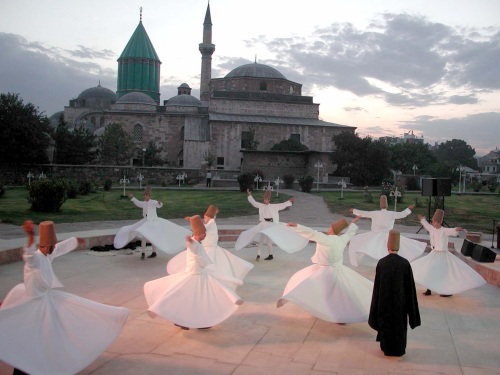For you died, and your life is now hidden
with Christ in God.
-Colossians 3:3-4
I had the uncanny feeling a few days ago, that my life as I now know it is not my life. That one day I would exist, but not know that any of this had happened. And that this life, that I did not know, was in fact more real than the life I do know. I suddenly felt that it was not necessary or helpful, to concern myself with my life here as if it were important. As if it were the destination rather than the sideshow.
Now we shouldn't trust too much in uncanny feelings, but when that uncanny feeling starts resonating with all kinds of loose ends and puts them into place, giving you that context-unveiling "aha!' experience, it bears a closer look.
First there are two paradoxical assertions that need resolving. First, that some people find their way to spotless bliss (Heaven) without a shadow of sadness or pain, and second, that some don't (Hell). If you think about it, the second offers a bit of a challenge to the first. After all, people get to that spotless bliss by bucking the prevailing trend and becoming Children of God, who are distinguished by the fact that they are selfless, merciful and good. If they are all these things, they would almost have to be disturbed by the sufferings of those people who are still in "Hell" (actually this world).
And yet here I had this feeling, this seeming knowledge, that not only would I not know that anyone else was still suffering on this Earth, but that I in fact wouldn't remember my life, my name, or the sufferings that I myself went through. Nevermind anyone else's.
“He will wipe every tear from their eyes.
There will be no more death or mourning or crying or pain,
for the old order of things has passed away.”
-Revelations 21:3-4
The first approach to this Heaven/Hell quandary is relatively pedestrian (to me), but I might as well get it out of the way. If one believes that the very existence of souls implies choice, and that the most important choice is between God and Self-as-god (rebellion), which we are equally free to choose, then actually being free to make that choice is important. Even if from an enlightened point of view, Self-as-god is folly; it only appears such to one who has already made that choice in favor of God. A soul is distinguished by the fact that it is free: the opposite of soul is automaton. Jesus was distinguished, among other things, by a total absence of coercion: Jesus didn't force himself on anyone. He didn't even defend himself against wrongful physical attack, and taught his disciples to be the same way. Forcing that fundamental decision is equivalent to removing from a soul that which makes it a soul: choice. Mercy in this case is neither possible not desirable.
This was not what blew my mind though. What blew my mind is the experience of the world as fundamentally unreal. It is one thing to think it is unreal, another for that unreality to become palpable in some sense.
No one is required to recognize the importance of an unreality. If you go to a Broadway play, you will see the depiction of all kinds of situations, emotions, drama and so on. You may in fact get very wrapped up in this play. When the curtains go down and the lights come on, however, you return to your actual life. You will probably soon forget what the play was about. But what if you couldn't ever leave the play, or didn't want to?
Taking the reality of the world ultimately seriously is in fact the prison bars of the reality we have locked ourselves away in. Now, obviously in a prosaic sense the world is perfectly real. If you hit me in the head with a broom handle, it will hurt. If you drop a piano out the window, it won't magically be suspended above the ground by pixie dust. It will really fall, and might really hurt someone. However, this "prosaic sense" is of course defined by the rules of the world itself. If in a video game I hit the "fire" button, the image on the screen will actually show a shooting animation and the appropriate realistic damage, but it doesn't mean that any of it is "real" in a higher sense.
(Interestingly, I had a sort of prefiguring of this experience decades ago, when for a period of a week or so I saw the entire world as made of pixels. Seriously. Where other people saw real objects, I saw pixels. I attributed it to too much computer gaming at the time though.)
Similarly, the world is perfectly real from the viewpoint of the world. From outside the world, it looks like that Broadway play. Everyone is acting as if it is real, but it isn't. Meanwhile, your real life is hidden from your view.
This idea is of course old hat. Twenty-five centuries ago, Plato wrote his "Allegory of the Cave" about just such an appraisal of reality. The real question is, why should anyone believe it is true? Their senses, after all, tell them it is false. There cannot in fact be evidence for something that transcends the system of evidence, any more than the existence of non-numeric values could be proven by arithmetic.
To believe in God at all involves believing in a "higher reality" that you cannot directly experience with the senses. This reality, consequently, is a lower reality: i.e. "less real". Of course most believers in God take 1 step forward and 2 steps back in this respect. They believe in a God, whose job it is to make their lives in this world more agreeable. To get them a good job, a mate, excellent sex, intelligent and well behaved children, abundant food and jolliness, freedom from excess pain, and so on. They don't in fact believe in God per se, they believe in a beneficent zookeeper; the zoo in question being the World. I believe there is in fact such a zookeeper, but good luck getting treats from him.
You only have to take a gander at Luke 6:20-26 to see that this is in no way the God Jesus was talking about. If you look closely in fact, you will see that the real characteristics of a godly person as versus an ungodly one, is how seriously they take the directives of this reality. The godly person as Jesus describes him:
- Is probably poor (Luke 6:20-21 among others)
- Is nonviolent even in self-defense (Matthew 5:39)
- Is more likely to weep than laugh (Luke 6:21 among others)
- Is hated, excluded and rejected (Luke 6:22 among others)
- Is willing to sacrifice himself (John 15:13, Luke 9-24)
- Will give to those who ask him (Matthew 5:38-42 among others)
- Is not sexually lustful (Matthew 5:27-28 among others)
- Does not seek or enjoy human praise (Luke 6:26 among others)
In other words, these values are the inverse of those of the normal natural man who believes in this reality as the only one. These values in fact only make sense if you believe that this reality isn't that important, that there is another more important reality. The apostles had a label for the reality of our senses, they called it the World (which I capitalize to differentiate it from the mundane definition). The World as far as they are concerned is a bad thing.
Do not love the World or anything in the World.
If anyone loves the World,
the love of the Father is not in them.
-1 John 2:14
What is highly valued among men is
detestable in God's sight.
-Luke 16:15
That's pretty unambiguous, right? Why not love the World? Even if it is a lower reality, why is that necessarily bad? If the World is a prison, those who are Worldly are the Trustees. They are following the system and want everyone else to follow it too. They are supporting the system that enslaves them. The godly ones are those who are digging behind the vent with a spoon, trying to escape. The World is a prison, and whether the inmates agreed to go in originally or not, the fact remains that they are slaves to an illusion. There are some who don't want to break the illusion, who want to remain in the prison. In the movie The Matrix, there was one of the rebels who had second thoughts. He wanted Agent Smith to plug him back in the matrix, and he was willing to betray his friends to do it. Not everyone wants out, but it is a prison nonetheless. A prison whose bars you cannot see. And what is it like outside the prison? What were we supposed to be, before we got in the slammer? What inheritance did we give up to humor this illusion? Being Children of God. Being angelic beings. Being like Christ.
I had a momentary preview of my life that was hidden in God, beyond the World.
Dear friends, now we are children of God,
and what we will be has not yet been made known.
But we know that when Christ appears,
we shall be like him, for we shall see him as he is.
-1 John 3:2
Then the righteous will shine like the sun in the kingdom of their Father.
-Matthew 13:43

















